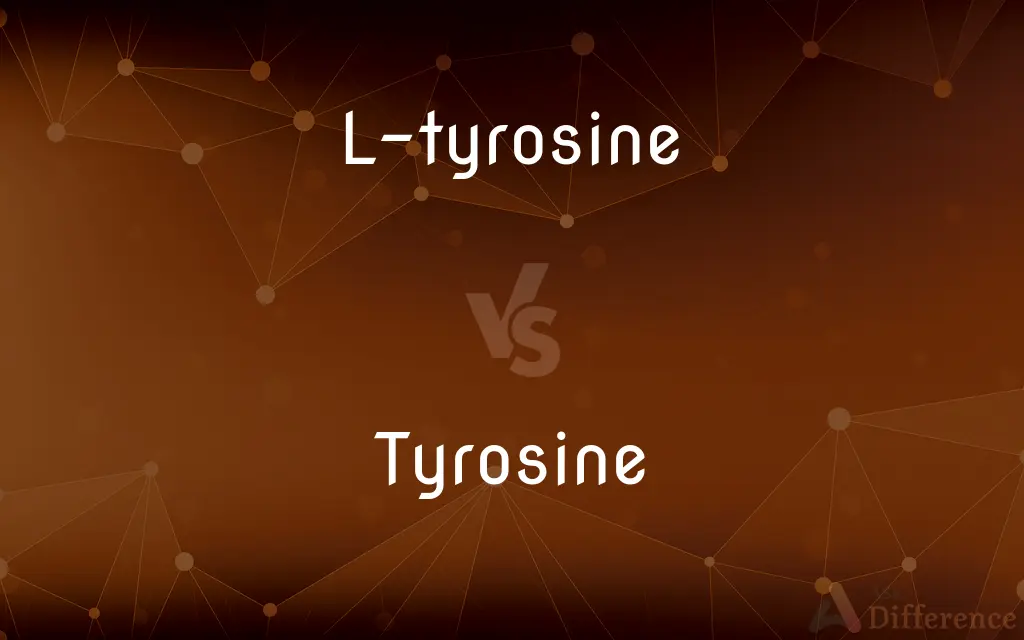L-tyrosine vs. Tyrosine — What's the Difference?
By Maham Liaqat & Urooj Arif — Published on October 8, 2024
L-tyrosine is the naturally occurring, biologically active form of tyrosine, essential for protein synthesis and neurotransmitter production, whereas tyrosine refers to the amino acid in general, without specifying its optical isomer.

Difference Between L-tyrosine and Tyrosine
Table of Contents
ADVERTISEMENT
Key Differences
L-tyrosine is an amino acid that plays a crucial role in the human body, acting as a building block for protein synthesis and being pivotal in the production of several important neurotransmitters like dopamine, epinephrine, and norepinephrine. These neurotransmitters are essential for brain function, influencing mood, alertness, and cognitive processes. In contrast, the term "tyrosine" without the prefix 'L-' is more general and can refer to either of the two optical isomers of the amino acid: L-tyrosine, which is biologically active in humans, or D-tyrosine, which is not naturally occurring in proteins and is biologically less significant.
L-tyrosine is found in dietary sources such as chicken, turkey, fish, peanuts, almonds, avocados, milk, cheese, bananas, and soy products, making it accessible through a balanced diet. It is also available as a dietary supplement, often promoted for its potential benefits in improving mental performance under stress or sleep deprivation. On the other hand, when people refer to tyrosine supplements or research, they are typically referring to L-tyrosine, since D-tyrosine is not used by the body in the same way and is rarely supplemented or studied for its effects on health.
The supplementation of L-tyrosine has been studied for its potential to improve cognitive flexibility, reduce the effects of stress and fatigue on cognitive performance, and support the synthesis of neurotransmitters that can be depleted during periods of prolonged stress. Conversely, the generic use of the term "tyrosine" in supplements almost invariably refers to L-tyrosine because of its relevance to human health, with D-tyrosine lacking significant nutritional or therapeutic interest.
Chemically, both L-tyrosine and D-tyrosine share the same molecular formula (C9H11NO3), but they are mirror images of each other, a property known as chirality. This chirality is crucial because it determines how each isomer interacts with biological systems. L-tyrosine's specific orientation allows it to fit precisely into enzymes and receptors in the human body, facilitating its involvement in metabolic pathways and neurotransmitter synthesis. D-tyrosine, while chemically similar, does not interact with these biological systems in the same beneficial way.
The production of L-tyrosine through metabolic pathways and its incorporation into proteins are essential for various physiological processes, including the synthesis of thyroid hormones and melanin, the pigment responsible for hair and skin color. In contrast, the role of D-tyrosine in human biology is minimal, and it does not participate in these processes to any significant extent. The study and application of L-tyrosine in nutrition and medicine reflect its critical role in health and disease, highlighting the importance of specifying the "L-" prefix when discussing its benefits.
ADVERTISEMENT
Comparison Chart
Biological Role
Synthesis of proteins and neurotransmitters
General term for the amino acid
Dietary Sources
High-protein foods like chicken, fish, almonds
Refers generally to L-tyrosine sources
Supplementation Benefits
May improve mental performance and stress resilience
Generally refers to L-tyrosine benefits
Chemical Interaction
Biologically active form that interacts with human metabolism
Includes both L- and D- forms, but D-form is biologically less significant
Application in Health
Studied for cognitive and emotional health benefits
Use in supplements implies L-tyrosine
Compare with Definitions
L-tyrosine
Plays a role in the synthesis of thyroid hormones and melanin.
L-tyrosine is crucial for maintaining healthy thyroid function and skin pigmentation.
Tyrosine
General term that includes both L- and D- forms of the amino acid.
In most biological contexts, tyrosine refers to the L- form.
L-tyrosine
Found in high-protein foods, essential for human health.
Consuming chicken and fish provides natural sources of L-tyrosine.
Tyrosine
Involved in various physiological processes when specified as L-tyrosine.
Tyrosine is necessary for the production of several critical hormones.
L-tyrosine
Important for the production of dopamine, norepinephrine, and epinephrine.
L-tyrosine's role in neurotransmitter synthesis influences mood and alertness.
Tyrosine
An amino acid important for protein synthesis in the body.
Tyrosine is a non-essential amino acid because the body can produce it.
L-tyrosine
The biologically active form of tyrosine, involved in neurotransmitter production.
L-tyrosine supplementation is considered by some to support cognitive function under stress.
Tyrosine
Can be synthesized in the body from phenylalanine.
Individuals with PKU must monitor their intake of phenylalanine to manage tyrosine levels.
L-tyrosine
Can be taken as a dietary supplement to potentially enhance mental performance.
L-tyrosine supplements are popular among individuals seeking to improve focus.
Tyrosine
Present in many high-protein foods, contributing to a balanced diet.
Including tyrosine-rich foods like almonds and avocados supports overall health.
Tyrosine
A nonessential amino acid, C9H11NO3, that is produced in the body from phenylalanine and is a precursor of melanin and of several neurotransmitters and hormones, such as epinephrine and thyroxine.
Tyrosine
(amino acid) A nonessential amino acid 2-amino-3-(4-hydroxyphenyl)propanoic acid found in most animal proteins, especially casein
Tyrosine
An amino acid found in most proteins; a precursor of several hormones
Common Curiosities
Is it necessary to supplement with L-tyrosine if I eat a high-protein diet?
Most individuals get sufficient L-tyrosine from their diet, but supplements might be considered under specific conditions or dietary restrictions.
Are there any known benefits of taking L-tyrosine supplements?
L-tyrosine supplements may improve cognitive performance, especially in stressful situations, by replenishing neurotransmitters.
Can L-tyrosine help with weight loss?
While L-tyrosine plays a role in thyroid hormone production, its supplementation alone is unlikely to cause significant weight loss without diet and exercise.
Can D-tyrosine be converted to L-tyrosine in the body?
The body does not effectively convert D-tyrosine to L-tyrosine; thus, D-tyrosine is biologically less significant.
Is L-tyrosine safe for everyone to take?
L-tyrosine is generally safe for most people, but individuals with certain medical conditions or on medication should consult a healthcare provider.
How does L-tyrosine affect brain function?
By supporting the synthesis of neurotransmitters involved in mood, cognition, and alertness, L-tyrosine can positively affect brain function.
Why is L-tyrosine considered biologically active?
L-tyrosine is the form that participates in human metabolism, influencing the synthesis of proteins, enzymes, and neurotransmitters.
What is the difference between essential and non-essential amino acids like tyrosine?
Non-essential amino acids like tyrosine can be synthesized by the body, whereas essential amino acids must be obtained through the diet.
Can L-tyrosine supplementation improve exercise performance?
Some research suggests L-tyrosine may help with endurance and mental focus during exercise, but results are mixed.
Are there any side effects of taking L-tyrosine supplements?
High doses may cause side effects like nausea, headache, or gastrointestinal distress in some individuals.
Does cooking affect the L-tyrosine content in food?
Cooking can affect nutrient levels, but L-tyrosine in high-protein foods is generally stable under normal cooking conditions.
Why is L-tyrosine included in some pre-workout supplements?
Its potential to improve focus and reduce stress responses may make it a valuable addition to pre-workout formulas.
How quickly does L-tyrosine supplementation affect the body?
Effects can vary, but some individuals report feeling benefits within a few hours to days of supplementation.
Share Your Discovery

Previous Comparison
Creative Thinking vs. Critical Thinking
Next Comparison
Self Esteem vs. Self ActualizationAuthor Spotlight
Written by
Maham LiaqatCo-written by
Urooj ArifUrooj is a skilled content writer at Ask Difference, known for her exceptional ability to simplify complex topics into engaging and informative content. With a passion for research and a flair for clear, concise writing, she consistently delivers articles that resonate with our diverse audience.













































